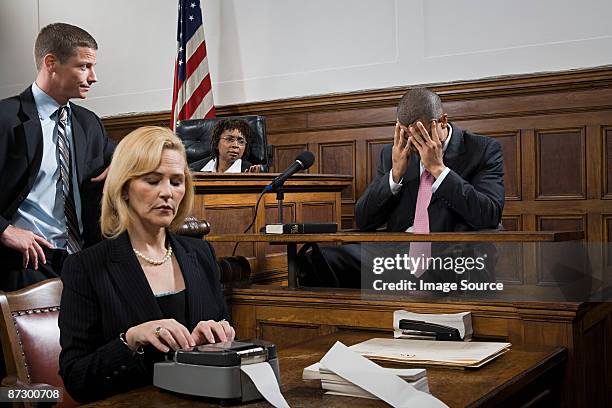How to Start a Career as a Professional Court Typist: Step-by-Step Guide
How to Start a Career as a Professional Court Typist: Step-by-Step Guide
Blog Article
Checking Out the Day-to-Day Responsibilities of a Court Typist in the Judicial System
As you browse the elaborate globe of the judicial system, you could discover on your own curious about the role of a court typist. This position is greater than just inputting; it includes capturing every word talked during process with precision. Every day provides distinct challenges and obligations that are crucial for keeping the honesty of lawful records. Recognizing what a court typist does can expose understandings into the wider operations of justice. What does it take to stand out in this role?
Summary of the Court Typist Role
As you tip into the role of a court typist, you'll discover it is vital to comprehend the essential obligations included. You'll work as an important link in the judicial procedure, ensuring that all spoken words during court procedures are precisely caught and documented. Your work supports the stability of the legal system, making your interest to information imperative.You'll run customized transcription tools, converting audio recordings into written transcripts. Recognizing with lawful terms and court treatments is key, as you'll typically experience complex language and jargon.You'll likewise need to maintain confidentiality and handle delicate details with care. Your role needs you to function successfully under stress, commonly with limited deadlines, while remaining focused on creating clear, exact transcripts. As a court typist, you play a crucial role in preserving the authorities document of court process, adding significantly to the overall functioning of the judiciary.

Trick Responsibilities of a Court Typist
While you'll commonly be concentrated on catching talked words throughout court procedures, your crucial obligations as a court typist expand much past transcription. You'll prepare and preserve accurate records of court activities, guaranteeing they show every detail of the process. You'll likewise layout files, such as lawful briefs and summons, adhering to strict guidelines and deadlines.In addition, you'll manage and organize instance documents, making it simpler for lawyers and judges to gain access to crucial details rapidly. You're anticipated to proofread and edit transcripts for clearness and precision, which is necessary for the integrity of lawful proceedings.Moreover, you'll work carefully with courts, clerks, and lawyers, maintaining open communication to attend to any requests or inconsistencies. Your function is essential in making sure that the judicial procedure runs efficiently, providing a trustworthy created account of what transpires in the court.
Vital Abilities for Court Typists
As a court typist, you require to understand both typing speed and accuracy to stay on par with the needs of the courtroom. Familiarity with legal terms is likewise essential, as it assures you precisely record the process. These skills not just boost your performance but also contribute to the overall effectiveness of the legal process.
Entering Speed and Accuracy
Keying in speed and accuracy are necessary abilities that every court typist need to grasp to ensure the honesty and performance of lawful documents. You require to type rapidly yet very carefully, as also small errors can result in considerable misunderstandings in legal contexts. A high keying rate permits you to stay up to date with busy court process, making certain that every word is captured properly. Exercising regularly can aid you boost your rate, while focusing on accuracy helps in reducing mistakes. Making use of devices like dictation software or text expanders can additionally improve your effectiveness. Keep in mind, your role is vital in keeping accurate documents, so refining these skills not just benefits you however likewise supports the whole judicial procedure.
Lawful Terminology Efficiency
Mastering lawful terminology is important for court typists to assure precise and reliable documents. You need to acquaint yourself with different lawful phrases, jargon, and principles frequently used in court process. This expertise aids you transcribe recordings and draft documents with precision. When you comprehend terms like "complainant," "accused," and "subpoena," you'll reduce the opportunities of errors that might compromise legal proceedings.Additionally, exceling in lawful terminology improves your confidence while working along with judges, attorneys, and other lawful professionals. You'll discover it easier to comply with discussions and accurately record the essence of what's being stated. court typist. Continuous discovering and method will certainly enhance your abilities, making you a beneficial asset in the judicial system
Tools and Modern Technology Made Use Of by Court Typists
As a court typist, you depend on numerous devices and technology to do your obligations efficiently. You'll need vital keying tools, user-friendly software application applications, and audio transcription devices to maintain pace with the needs of your task. Allow's explore how each of these elements plays a vital role in your daily tasks.
Vital Keying Tools
While court typists count greatly on their abilities, the appropriate tools is essential for efficiency and precision. To start with, a high-quality keyboard is important for accurate and quick inputting, enabling you to equal courtroom proceedings. Ergonomic designs can assist protect against pressure throughout long sessions. A trusted computer system with adequate processing power assurances smooth operation, especially when managing big files (court typist). You'll also need a great printer for producing clear copies of records. Noise-canceling earphones can be useful throughout recordings, aiding you focus on audio quality. Furthermore, an efficient work area and a comfortable chair promote performance. With the appropriate tools, you can improve your typing capabilities and sustain the judicial process properly
Software Program Applications Used
To efficiently record court procedures, you'll depend on a variety of specialized software program applications developed for accuracy and speed. These programs typically consist of word handling software, which assists you format records rapidly and appropriately. You'll likewise use legal-specific software application that aids in taking care of case documents and maintaining documents, ensuring you can quickly access critical information.Another necessary tool is real-time transcription software program, enabling you to create transcripts as the procedures unfold. Additionally, you could use record administration systems to arrange and recover files effortlessly. With these applications, you'll improve your performance and preserve the high criteria required in the judicial system, enabling you to concentrate on your typing abilities and the task at hand.

Sound Transcription Devices
Court typists often depend on a range of audio transcription devices to boost the precision of their job. These devices aid you transform talked words into created text successfully. You may use software like Dragon NaturallySpeaking or Otter.ai, which use voice acknowledgment capacities, allowing for fast transcription. Additionally, audio playback devices allow you to listen to recordings continuously, ensuring you catch every information correctly. Some court typists also utilize foot pedals, allowing you regulate audio playback hands-free while you type. This combination of technology not only quickens the transcription process yet also reduces mistakes. Acquainting yourself with these tools can significantly boost your productivity and the high quality of your transcriptions in the hectic judicial setting.
Challenges Dealt With by Court Typists
Although several might check out the role of a court typist as uncomplicated, you'll quickly discover that it includes an unique set of difficulties. One significant hurdle is the fast lane of court proceedings. You'll need to stay on top of fast discussions, which can be daunting, particularly when several audio speakers are included. In addition, the lawful lingo utilized in court can be complicated and strange, requiring you to continuously learn and adapt.Another challenge is the pressure of limited target dates. You often have to produce transcripts promptly, which can bring about stress and anxiety and possible mistakes. Furthermore, preserving emphasis for extended periods is important, as even a short-term gap can affect your work.Lastly, dealing with secret information suggests you need to always focus on safety and security and discernment, including another Visit Website layer of responsibility to your role. Balancing these challenges becomes important for anyone in the setting of a court typist.
The Importance of Accuracy and Focus to Detail
Precision and attention to information are vital for court typists, as even minor blunders can cause considerable misconceptions in legal proceedings. You are accountable for transcribing court hearings, legal papers, and various other necessary information, where every word matters. A straightforward typo or misplaced spelling might modify the meaning of a declaration, possibly impacting the result of a case.When you concentrate on precision, you help keep the stability of the judicial system. Your meticulous work sustains lawyers, courts, and customers by offering clear and specific records. Interest to information also reduces the danger of pricey hold-ups and guarantees that all events entailed have access to trusted files.
Profession Course and Opportunities for Court Typists
Understanding accuracy and attention to detail not just boosts your existing role but also opens up doors to numerous job courses for court typists. As you gain experience, you might take into consideration progressing to placements such as legal assistant or administrative aide in legislation companies, where your skills in transcription and paper monitoring will certainly be invaluable.You can additionally discover possibilities in court coverage, which often requires added training yet offers an opportunity to engage more directly with courtroom proceedings.If you delight in the administrative side, positions in case administration or lawful research study might be a wonderful fit.With better education, you might also come to be a legal assistant, helping legal representatives with situation preparation.Networking with attorneys can help you uncover hidden opportunities.Ultimately, your structure as a court typist outfits you with skills that are widely applicable throughout the lawful landscape, leading the way for a meeting occupation.
Often Asked Concerns

What Certifications Are Required to Come To Be a Court Typist?
To come to be a court typist, you'll require solid inputting abilities, understanding of legal terms, and focus to information. A senior high school diploma is often called for, and qualifications in transcription can boost your credentials.
How Does a Court Typist Manage Confidential Information?
You deal with private information by following rigorous methods, using secure systems, and maintaining discernment. You're educated to acknowledge sensitive information and ensure it's stored and shared just with authorized personnel, safeguarding the honesty of the info.
What Is the Common Job Setting for Court Typists?
You'll normally locate court typists in an official workplace setting, frequently surrounded by attorneys. The setting's generally silent, focused, and structured, allowing you to focus on transcribing and taking care of delicate files efficiently.
Are Court Typists Required to Take Dictation During Trial Runs?
Yes, court typists often take dictation throughout tests. You'll require to listen thoroughly, recording legal procedures properly and efficiently. Your emphasis and rate will certainly assure that every detail is captured for official documents.
Just How Do Court Typists Take Care Of Due Dates During Busy Durations?
Throughout busy periods, you focus on tasks by organizing your workload and using reliable inputting techniques. You set practical deadlines, interact with coworkers, and remain focused to assure all files are completed properly and on time. While you'll commonly be concentrated on capturing spoken words throughout court process, your vital responsibilities as a court typist prolong much past transcription. Keying in rate and precision are essential skills that every court typist should grasp to ensure the stability and performance of lawful documents. Understanding lawful terms is essential for court typists to guarantee accurate and efficient documentation. Accuracy and attention to detail are important for court typists, as even find more information minor mistakes can lead to significant misunderstandings in legal procedures. court typist. To become a court typist, you'll need strong inputting skills, understanding of click to find out more legal terminology, and attention to detail
Report this page